This disease is a chronic, inflammatory and recurrent process that predominantly affects the scalp area.
It is generally accepted that scalp psoriasis is only the initial stage of psoriasis, which involves the development of more severe forms throughout the body.
Characteristics of manifestations and course of the disease
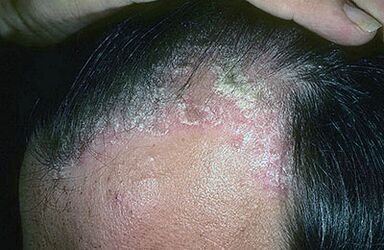
A disease such as scalp psoriasis is manifested by the appearance of a thick "cap" on the scalp, which is subsequently accompanied by severe itching and dandruff.
There is another variant of manifestation when individual small plaques are formed.
The symptoms of psoriasis differ from seborrheic dermatitis, the complete absence of violations of the hair root structure.
With scalp psoriasis, there are no symptoms of hair loss at all.
The scales that form in psoriasis contain a large amount of sebum, so they are easily recognizable by touch, which cannot be said about peeling during seborrheic dermatitis.
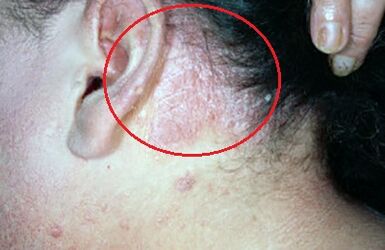
The most vulnerable areas of the head with psoriasis include:
- The area around the ears, the earlobes.
- Separation area.
- Frontal, occipital and cervical region.
Scalp psoriasis is common, characterized by frequent relapses, and is chronic.
This dermatological disease always has a chronic stage, because it is impossible to completely cure.
It is psoriatic disease on the scalp that is considered the most common.
Reasons for the development of diseases
The main cause of this condition is hereditary predisposition.
If a person's close relatives have this disease, then the probability of its hereditary transmission is at least 70%.

Secondary causes of psoriasis include:
- Hormonal imbalance.
- Reducing the body's defenses.
- Liver and biliary tract diseases.
- Alcohol abuse and tobacco smoking.
- Being in a state of constant stress, lack of sleep.
- Improper diet.
But these are far from all the reasons why this disease can occur.
Some reasons are too rare, so try not to mention them.
This disease is most common in people aged 40-42 and older. If people under the age of 20 suffer, it is usually associated with a weakened immune system or hormonal disorders. Therefore, after prescribing a course of vitamins and restructuring a person with a focus on an active healthy lifestyle, the irritations disappear.
It is noticed that after each well-designed treatment, the skin is gradually cleansed, no scars remain, and the papules with inflammation do not return.
Main symptoms
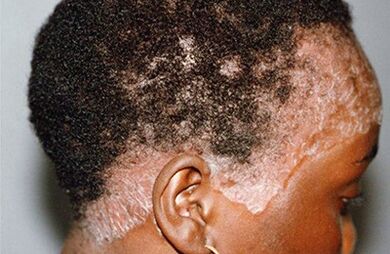
In any of the areas described above that psoriasis of the scalp develops, it will always be accompanied by the appearance of single or multiple foci of inflammation, which will be complemented by the appearance of characteristic dense scales, and accompanied by severe itching.
The primary stage of the disease has almost no pronounced symptoms, often patients do not know that they have been affected by dermatological pathology. The patient has no complaints, external examination does not show specific symptoms.
Also, some patients notice that the initial stage is very similar to dandruff, so long shampoo treatments are possible to remove the false pathology.
If the process is neglected, it can spread deep into the skin, affect the root system of the hair and cause hair loss.
A disease such as scalp psoriasis has its own stages of flow, which include:
- Progression phase. New symptoms of inflammation appear. This process takes place in the direction from the center to the periphery.
- Stationary stage. It is characterized by relative calm, during which new inflammatory elements cease to form, but the existing symptoms do not disappear.
- Regression phase. At this stage, the main symptoms of psoriasis disappear. Typical psoriatic eruptions are replaced by pigmentation foci.
Treatment characteristics
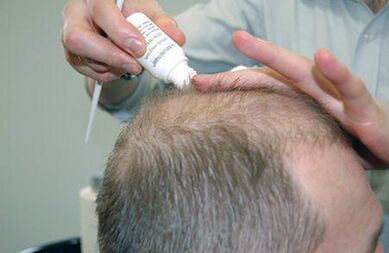
A process such as treating scalp psoriasis should be viewed as a whole set of measures. This set of measures can be roughly divided into:
- General therapy.
- Local therapy.
- Physiotherapy treatment.
- Spa treatment.
- Traditional methods.
General or drug therapy involves the appointment of the following groups of drugs that can effectively treat psoriasis:
- Sedatives.
- Multivitamin tablets.
- Hyposensitizing drugs.
- Drugs with cytostatic action.
- Corticosteroid drugs.
- Antihistamines.
- Immunomodulatory agents.
- Drugs for non-specific drug therapy (ATP).
It is important to remember that the use of drugs with cytostatic effect and corticosteroids is possible only if the disease is severe. They should be used with great caution, otherwise they can cause significant worsening of the disease.
Antibacterial drugs can be used only if the pathogenic microflora is associated.
Topical treatment of scalp psoriasis involves the use of the following remedies:
- Ointments with keratoplastic action: ichthyol ointment, naphthalene ointment, salicylic ointment, sulfur-tar ointment.
- Glucocorticoid fats. Such ointment is used only in severe cases of the disease.
- Folk remedies for local use.
Shampoos are used as another effective treatment. The only caveat is that this tool will only be effective in combination with other methods.
As an effective remedy for the treatment of scalp psoriasis, the following have been proven:
- Tar shampoo.
- Zinc shampoo.
- Shampoo containing ketoconazole.
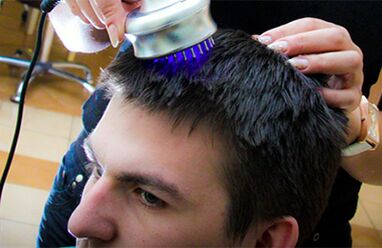
Physiotherapy is another effective topical remedy for psoriasis.
The following physiotherapeutic agents are used to treat psoriasis of the head:
- UV radiation of the skin.
- Hydrotherapy.
- Plasmapheresis method.
- Hemisorption.
- Laser radiation.
- Mud liners and applications.
- Heliotherapy.
- Bathing in hydrogen sulfide springs and medicinal baths.
A typical technique is to alleviate stress and psychological stress. To achieve this, the patient is prescribed sedatives to alleviate high levels of nervous irritability. Saturation of the patient's body with vitamins is one of the most important details in treatment.
When determining which diet is best for the patient, the compatibility of food and medication is always taken into account, as well as the food itself in its range. This important detail helps to reduce the load on the patient's gastrointestinal tract, as well as other internal organs.
Folk remedies are used as additional methods.
Methods of traditional medicine

Can scalp psoriasis be cured by traditional methods? It is impossible to answer this question unequivocally.
We can only say that folk methods as an independent method of treatment are ineffective, only in addition to the main. Let's look in detail at the most effective alternative methods that can treat scalp psoriasis.
Method number 1. It is necessary to prepare celandine juice by first passing the celandine plant through a meat grinder and then squeezing it. This product can be supplemented by adding 40 ml of dry red wine, and then it can be applied in the form of a lotion on the affected areas of the scalp.
Method number 2. You can also use an alcoholic tincture of the celandine plant to lubricate the scalp. To prepare it, pour half a cup of dried herbs with 0. 5 liters of 70% medical alcohol (you can use vodka).
This medicine should be insisted on for 7 days, after which it can be used to erase the affected areas. Also, after applying the tincture, you can wash your hair with a strong infusion of chamomile.
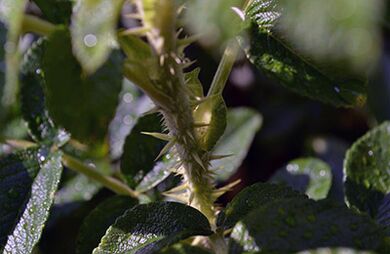
Method number 3. As an excellent means of general detoxification of the body, you can use "Monastery Tea", which cleanses the body of toxins, cleanses the liver and helps get rid of all manifestations of psoriasis. During the treatment period, this tea can be drunk instead of the usual black or green tea.
Method number 4. It is possible to treat cutaneous manifestations of scalp psoriasis by folk methods using the fruits and stems of rose hips.
To do this, it is necessary to burn the stems and fruits to an ash state, after which this agent must be rubbed into the affected areas. Apothecary Vaseline can be added for better ash absorption.
It is recommended to remove traces of oil on the skin and hair from folk remedies with vinegar solution. It is usually made in a ratio of 50x50 parts. There are many treatment options, but it is always important to choose the right one. It is best to seek expert advice for this.
Prophylaxis
To prevent the recurrence of scalp psoriasis, you must adhere to the following rules:
- Follow the rules of personal hygiene, properly care for your hair and scalp.
- Refrain from smoking alcohol and tobacco.
- Limit stressful situations as much as possible.
- Adhere to the mode of work and rest.
- Adhere to a special diet.
- Take multivitamins every six months.
- Hair should be dyed only with hypoallergenic dye or not dyed at all.
- Treat all existing diseases on time.
- For general strengthening of the body it is necessary to use folk methods.
From all the above, we can conclude that scalp psoriasis is not an independent disease, but just another manifestation of such a serious disease.
From the point of view of financial costs, the described treatment can be called budgetary, while the stereotype "the more expensive, the better" is unacceptable. There is nothing in the world more valuable than your health and the health of your loved ones. And remember that it is better to prevent disease
Be healthy!























